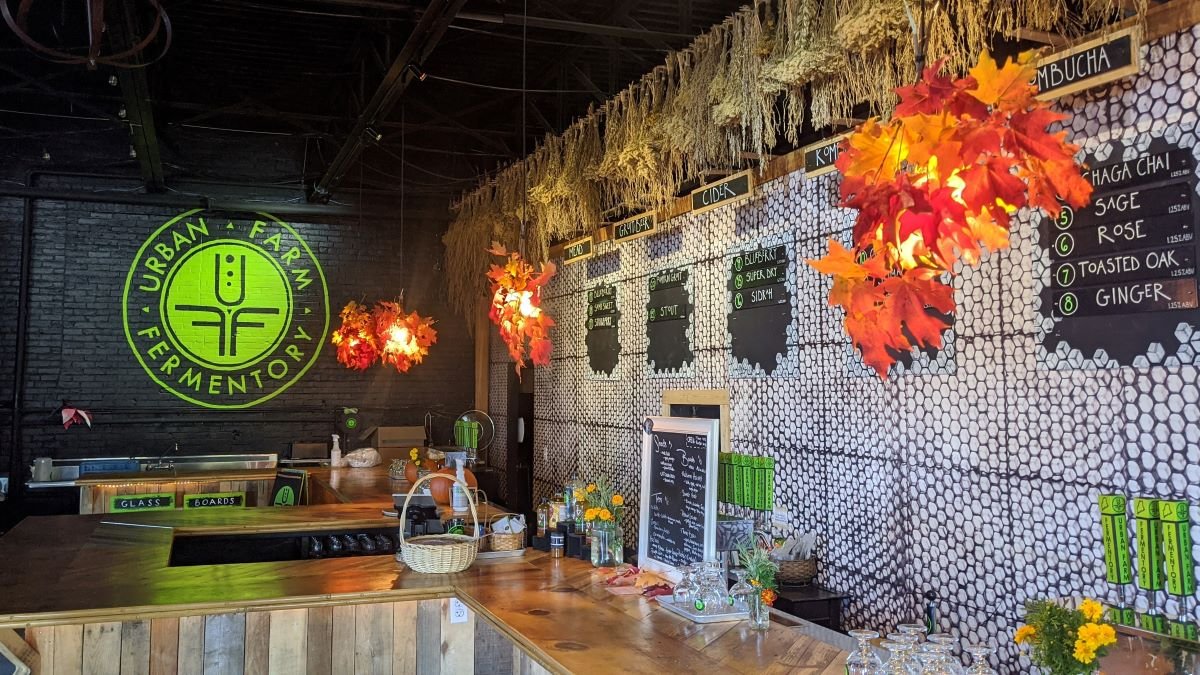Living Waters: Maine’s kombucha brewers
PHOTO COURTESY ROOT WILD KOMBUCHA.
Ancient fermenting traditions are alive and well in Maine’s kombucha culture.
By Saisie Moore
THERE’S SOMETHING interesting brewing across Maine, and this time it’s not beer! As brewery culture proliferates, stylish open- plan tasting rooms have become hugely popular destinations for friends and families to spread out and share a drink. But hazy IPAs and high alcohol by volume (ABV) craft ales don’t work for everyone. Since 2010, creative Mainers have begun pushing the envelope on kombucha—and the results are paying off. The fizzy, fermented tea drink has gone from a health store curiosity to a mainstream favorite. With local fermentors foraging for exciting new flavors and bottled ‘booch appearing on shelves from grocery stores to gas stations, we’ve officially entered the kombucha craze.
So what is it, actually? Kombucha is a fermented and slightly fizzy beverage made from combining green or black tea with a culture of friendly bacteria and yeast, called a SCOBY (symbiotic culture of bacteria and yeast), which feeds on sugar and fuels fermentation. Natural ingredients can be added to create both the familiar and unusual flavors created by Maine’s popular kombucha breweries.
Urban Farm Fermentory’s kombucha and cider flavors range from Elderberry to Ghost Chili Pepper to Blueberry Cidah. COURTESY PHOTO.
Urban Farm Fermentory • East Bayside, Portland
Back in 2010, before East Bayside in Portland was the hip hub of breweries it is today, Eli Cayer was renting an industrial space on Anderson Street and mulling over an idea. As a beekeeper with an interest in natural and medicinal drinks, the former Maine Mead Works founder began brewing cider in old Allagash barrels. At this point, kombucha was a health store curiosity, stocked for its probiotic properties. “It aligned with my ethos for Urban Farm Fermentory,” Cayer says, “wild fermented and medicinal beverages.” Right then, Maine reclassified kombucha’s status as a nonalcoholic beverage (averaging 2% ABV), and the drink was pulled from the shelves. Back in his Bayside fermentation lab, Cayer secured the first U.S. license to brew kombucha at 1.5%, using a process that would “stay true to its medicinal properties.” Cayer’s recipes, which this winter will include seasonal cranberry and elderberry flavors, use ingredients largely sourced from local farmers. Today, “UFF” is widely distributed across Maine and beyond. Its taproom space, an acid- green staple of Portland’s libation scene, serves up a selection of flagship and seasonal ‘booch, gruits, cider, and Jun, a kombucha alternative using honey and green tea or, in Cayer’s case, wild-foraged Maine sweet fern. The tasting room has reopened and aims to serve pours and bottles of everything from Chaga Chai to Toasted Oak flavors to spice up your winter palate.
A national pioneer of kombucha brewing, Urban Farm Fermentory has been serving funky concoctions in its East Bayside taproom and in stores across New England for over a decade. COURTESY PHOTOS.
Root Wild Kombucha • East Bayside, Portland
Just a short (yet admittedly steep) walk along Fox Street and you’ll come face to face with another staple of the Maine kombucha market.
Root Wild on Washington Avenue is housed in a combined production and taproom space, complete with a garage-style door and a mural wrapped around the facade like an intricate tattoo. Owner Reid Emmerich, a former brewer at UFF and an environmental science grad, launched Root Wild in 2018 to explore his interest in wild foraging and flavor experimentation. “Besides serving people the final product, my favorite thing is getting out there and connecting with nature and playing with local ingredients,” Emmerich says. You might even spot him harvesting white pine needles around South Portland for the pine and lavender blend. “I like introducing people to local plants they aren’t familiar with and sometimes don’t even know how to pronounce,” he says. “This year I’ve been gathering quince, staghorn sumac and autumn olive.” Seasonal releases to look out for include Spiced Apple with Chaga and Chai and Aronia Berry and Quince.
Look for inventive flavor pairings made from locally foraged ingredients at Root Wild on Washington Avenue in Portland, pictured here and above. COURTESY PHOTOS.
At their combination production space and taproom in Damariscotta, Maine Booch serves hard kombucha in antique glassware surrounded by vintage furnishing and local art–all available for purchase. COURTESY PHOTOS.
Maine Booch • Damariscotta
In Damariscotta, Chauncey Erskine began experimenting with double fermentation to produce a hard drink with a higher ABV for those looking to catch a buzz from their ‘booch. Erskine had “flirted with fermentation during travels in Ecuador, Vietnam and, most recently, Spain.” But it’s not easy to bring a living SCOBY across countries. The Mexicali Blues employee began his Maine brew shortly before lockdown, introducing leftover yeast from a batch of rhubarb wine into tea to make kombucha. Several months later he had 25 gallons of hard kombucha sitting in his spare room. After garnering positive feedback from friends and some stern words from his wife, Erskine acquired a large number of barrels from Split Rock Distillery and started double fermenting in a production space to create his first official batches of Maine Booch. Today they’re housed in a converted former bistro space in Damariscotta that combines production and a taproom, where guests can sample pours from three taps, including the flagship Aloha blend of hibiscus and ginger. Erskine plans to expand to seven taps over the winter, meaning you can sample ‘booch flavored from Schisandra berries or tulsi and orange rind in the taproom’s eclectic vintage glassware or fill up a growler or mason jar. The interior has been designed by Los Angeles set designer Danielle Filosa and features curated vintage furniture and local art, all for sale. Erskine plans to feature live music, game nights and dance parties this winter, too.
As more of us explore beyond the boundaries of beer and wine, or consider cutting out alcohol altogether, Maine’s kombucha culture appears to be growing—even appearing on tap in bars alongside traditional draft beers. Skeptical? Keep exploring the funky and fruity creations from local brewers and you might just find yourself converted.










